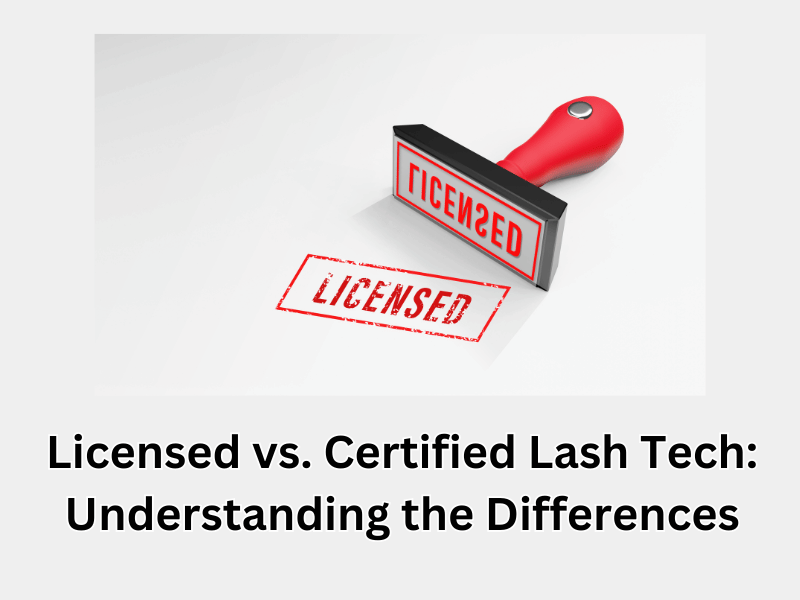Licensed vs. Certified Lash Tech: Understanding the Differences

Licensed vs. Certified Lash Tech: Understanding the Differences
The beauty industry is booming, and eyelash extensions have become one of the most sought-after services. If you’re considering getting eyelash extensions or becoming a lash technician, it’s crucial to understand the differences between a licensed and certified lash tech. This distinction can impact the quality of service you receive or provide, and understanding it helps ensure safety and professionalism in the industry.
What is a Lash Technician?
A lash technician, or lash tech, is a beauty professional who specializes in applying semi-permanent eyelash extensions to enhance natural eyelashes’ length, fullness, and curliness. The role requires a steady hand, an eye for detail, and a good understanding of different eyelash styles and application techniques.
Certification vs. Licensing
1. Certification:
- Definition: Certification is a credential given to lash techs who have completed a training program from a lash extension school or educator.
- Requirements: The requirements for certification can vary significantly depending on the training provider. It usually involves completing a course that covers the basics of eyelash extension application, safety protocols, and sometimes advanced techniques.
- Duration: Courses can range from a few days to a few weeks.
- Purpose: Certification shows that the individual has received specific training in lash application techniques and understands the basics of safe practice.
2. Licensing:
- Definition: Licensing is a formal permission granted by a government regulatory body that allows an individual to work as a lash technician legally.
- Requirements: Licensure requirements vary by state or country but generally include completing a certain number of hours in a cosmetology or esthetics program, passing a state board exam, and sometimes continuing education.
- Duration: A full cosmetology or esthetics program can take several months to over a year.
- Purpose: Licensing ensures that the individual meets the government-regulated standards of practice, which often include health and safety standards, sanitation, and sometimes broader beauty services beyond just lash extensions.
Key Differences
Scope of Training:
- Certified Lash Techs: Training is explicitly focused on lash extensions. They learn various techniques and styles, as well as client consultation and aftercare advice.
- Licensed Lash Techs: Training includes a broader range of beauty and health topics. They cover lash extensions, skincare, hair removal, makeup application, and more.
Legal Requirements:
- Certified Lash Techs: Certification alone does not usually fulfil legal requirements for working as a lash technician. Many states require lash techs to be licensed.
- Licensed Lash Techs: Licensing is legally required in many places for lash technicians to practice professionally. It ensures that the technician meets all local health and safety regulations.
Regulatory Oversight:
- Certified Lash Techs: Certification programs are often regulated by private organizations or beauty schools, with varying standards.
- Licensed Lash Techs: Licensing is regulated by government bodies, ensuring consistent standards and accountability.
Why the Distinction Matters
For Clients:
- Safety: Licensed lash techs have been trained in broader health and safety protocols, reducing the risk of infections or complications.
- Quality: Both licensed and certified lash techs can provide high-quality services, but licensing often indicates a higher level of comprehensive training.
For Aspiring Lash Techs:
- Career Opportunities: A certification and a license can open more career opportunities and potentially higher earning potential.
- Compliance: Understanding and meeting the legal requirements can prevent legal issues and fines.
How to Choose a Lash Tech
1. Check Credentials:
- Certification: Ensure your lash tech has a valid certification from a reputable training program.
- License: Verify that they hold a valid cosmetology or esthetics license if required in your area.
2. Experience and Reviews:
- Look for a lash tech with positive reviews and a portfolio of their work. Experience can be a significant indicator of skill and professionalism.
3. Hygiene and Safety Practices:
- Observe the cleanliness of the workspace and the technician’s adherence to safety protocols.
4. Consultation:
- A good lash tech will offer a consultation to discuss your desired look, assess your natural lashes, and explain the process and aftercare.
Conclusion
Understanding the difference between a licensed and certified lash tech is crucial for clients seeking quality lash services and individuals aspiring to enter the lash industry. Certification indicates specialized training in lash techniques, while licensing ensures broader compliance with health and safety regulations. Whether getting your lashes done or considering a career as a lash tech, prioritizing certification and licensing can lead to better outcomes and a more professional beauty industry.
Read More: https://usdigitalmagazine.com



